The Rochester Grammar school has found itself at the centre of controversy after its ‘slave auction’ lesson plan was shared across social media by angry parents. The Kent based school which declares on its website its adherence to British values “expected of anyone living in a modern Britain, regardless of their nationality, culture or religious belief” developed a resource for students ignoring the moral implications of enslavement in favour of examining the perceived economic benefits.
Children were first presented with a list of African people in a reimagined ‘Slave auction lot’. The list included phrases like “1 Ibo slave, 24 year old male, good condition, 9 Yoruba males, aged about 21. 3 are very strong, 1 less so. 2 Mandingo slaves, 1 woman (aged 23), 1 child (aged 6), 4 Ashanti, 3 males and 1 female, Pregnant woman etc”
Student were then asked to;
“Consider what sort of slave your business will need. Examine the characteristics of the slaves in source A… Would a combination of different types be more suitable? The key question is “What can I buy for my £100”
Mr Gwynn Bassan, the Head of School defended the racist lesson plan arguing it followed recommendations made by the Historical Association and the Department for Education and that they “absolutely teach students about the horrors of the slave trade, and the worksheet adapts primary sources of the time to illustrate the awful reality of slavery.”
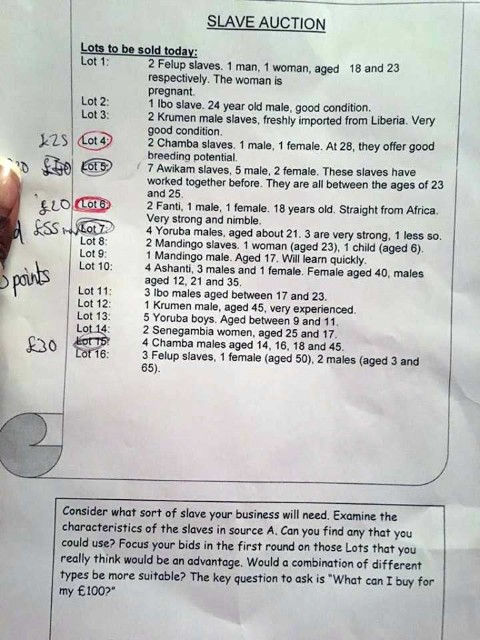
Rochester Grammar is one of many British schools that has failed to expunge racist ideology from its teaching practices when addressing the history of Maafa. In 2012, the Head teacher of the Queen Elizabeth’s Girls’ School in Barnet issued an apology following Ligali complaints about the use of similar offensive material during a lesson on slavery.
In this instance, the material which was presented to year 9 Students during a lesson on the ‘slave trade’ also trivialised the tragedy of African enslavement. Like Rochester, it focused on how best to commercially exploit human beings and included a lesson objective telling pupils to create a business proposal whilst devising a plan to enslave African people for the ‘Dragon’s Den’. It also made an indecent reference to the sexual abuse of African women as the ‘best thing about slavery’.
To address similar issues, earlier this year, on 1 June 2017, Akala, Abdul Mohamud, Robin Whitburn, Nick Draper, Toyin Agbetu, Lucy Capes, Katie Donington, Kristy Warren and Emma Winch were among the many educators, teachers and researchers gathered to present at the seminal event on History Education and Transatlantic Slavery at The Museum of London Docklands. The Workshop focused on giving teachers and other education professionals access to current academic scholarship and new pedagogical approaches to teaching the history of transatlantic and colonial enslavement.
In explaining why the Rochester Grammar school 'Slave Auction' lesson plan was dehumanising, Afriphobic and wholly inappropriate at any level of education. Toyin Agbetu said;
“It would be morally repugnant to teach about the horrors of ‘paedophile rings’ by listing nameless children by age, gender and physical attributes and then asking students to select which one would be best for sexual exploitation, so why can’t these teachers see the same principle applies to any activity that condones the enslavement of African people? Perhaps they have become so desensitised to Afriphobia that just like the Tory MP Anne Marie Morris who recently used the [n word] at a meeting, their own racist values have unwillingly become transparent”
Rochester Grammar has announced it based its lesson plan on recommendations from The Historical Association (HA).. However since the exposure caused by the racist controversy the HA has distanced itself from the school and attempted to shift the blame onto the Education team at Anti-Slavery International. Revealingly, it has removed its earlier response to the issue from its website. The page had stated;
“Rochester Grammar School uses this worksheet in the context of a detailed six-week programme which teaches the harrowing subject of slavery. Using guidelines written by Anti-Slavery (https://www.antislavery.org/) from our site, which are available at https://www.history.org.uk/primary/categories/788/resource/2811/teaching-slavery,
the worksheet explored arguments and attitudes presented at the time and exposed the racist rationale of those who supported the trade.
However, because this is an extremely complex history where prejudices can perpetuate if presented simply, the HA is happy to work further with Rochester Grammar School on the best way to deliver this material in future, so the horror and realities of the Trans-Atlantic trade and slavery itself are fully understood through its history lessons.”
It is worth noting that in its guide to teaching historical slavery, the Historical Association recommends teachers realise that during “the transatlantic trade, there was much slavery in other cultures, and an interesting comparison for pupils is to explore the slavery that existed within Africa at the time.” The HA describes itself as a UK Charity dedicated to the “study, teaching and enjoyment of history at all levels”.
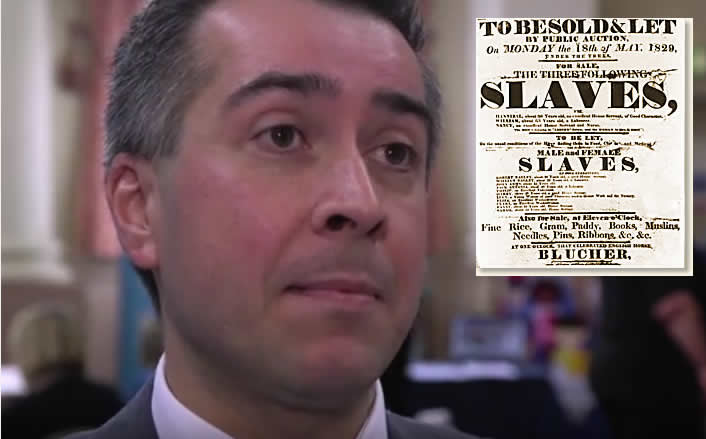
External Links
The Black Child AgendaHistory Education and Transatlantic Colonial SlaveryHA - Teaching Slavery
Pupil distressed after ‘best thing about slavery’ lessonWhy MP Anne Marie Morris should be sacked for racist outburst
Children were first presented with a list of African people in a reimagined ‘Slave auction lot’. The list included phrases like “1 Ibo slave, 24 year old male, good condition, 9 Yoruba males, aged about 21. 3 are very strong, 1 less so. 2 Mandingo slaves, 1 woman (aged 23), 1 child (aged 6), 4 Ashanti, 3 males and 1 female, Pregnant woman etc”
Student were then asked to;
“Consider what sort of slave your business will need. Examine the characteristics of the slaves in source A… Would a combination of different types be more suitable? The key question is “What can I buy for my £100”
Mr Gwynn Bassan, the Head of School defended the racist lesson plan arguing it followed recommendations made by the Historical Association and the Department for Education and that they “absolutely teach students about the horrors of the slave trade, and the worksheet adapts primary sources of the time to illustrate the awful reality of slavery.”

Racist slave auction lesson plan asks students to learn how to dehumanise African people for business
Failure to expunge racist ideology
Rochester Grammar is one of many British schools that has failed to expunge racist ideology from its teaching practices when addressing the history of Maafa. In 2012, the Head teacher of the Queen Elizabeth’s Girls’ School in Barnet issued an apology following Ligali complaints about the use of similar offensive material during a lesson on slavery. In this instance, the material which was presented to year 9 Students during a lesson on the ‘slave trade’ also trivialised the tragedy of African enslavement. Like Rochester, it focused on how best to commercially exploit human beings and included a lesson objective telling pupils to create a business proposal whilst devising a plan to enslave African people for the ‘Dragon’s Den’. It also made an indecent reference to the sexual abuse of African women as the ‘best thing about slavery’.
To address similar issues, earlier this year, on 1 June 2017, Akala, Abdul Mohamud, Robin Whitburn, Nick Draper, Toyin Agbetu, Lucy Capes, Katie Donington, Kristy Warren and Emma Winch were among the many educators, teachers and researchers gathered to present at the seminal event on History Education and Transatlantic Slavery at The Museum of London Docklands. The Workshop focused on giving teachers and other education professionals access to current academic scholarship and new pedagogical approaches to teaching the history of transatlantic and colonial enslavement.
In explaining why the Rochester Grammar school 'Slave Auction' lesson plan was dehumanising, Afriphobic and wholly inappropriate at any level of education. Toyin Agbetu said;
“It would be morally repugnant to teach about the horrors of ‘paedophile rings’ by listing nameless children by age, gender and physical attributes and then asking students to select which one would be best for sexual exploitation, so why can’t these teachers see the same principle applies to any activity that condones the enslavement of African people? Perhaps they have become so desensitised to Afriphobia that just like the Tory MP Anne Marie Morris who recently used the [n word] at a meeting, their own racist values have unwillingly become transparent”
Rochester Grammar has announced it based its lesson plan on recommendations from The Historical Association (HA).. However since the exposure caused by the racist controversy the HA has distanced itself from the school and attempted to shift the blame onto the Education team at Anti-Slavery International. Revealingly, it has removed its earlier response to the issue from its website. The page had stated;
“Rochester Grammar School uses this worksheet in the context of a detailed six-week programme which teaches the harrowing subject of slavery. Using guidelines written by Anti-Slavery (https://www.antislavery.org/) from our site, which are available at https://www.history.org.uk/primary/categories/788/resource/2811/teaching-slavery,
the worksheet explored arguments and attitudes presented at the time and exposed the racist rationale of those who supported the trade.
However, because this is an extremely complex history where prejudices can perpetuate if presented simply, the HA is happy to work further with Rochester Grammar School on the best way to deliver this material in future, so the horror and realities of the Trans-Atlantic trade and slavery itself are fully understood through its history lessons.”
It is worth noting that in its guide to teaching historical slavery, the Historical Association recommends teachers realise that during “the transatlantic trade, there was much slavery in other cultures, and an interesting comparison for pupils is to explore the slavery that existed within Africa at the time.” The HA describes itself as a UK Charity dedicated to the “study, teaching and enjoyment of history at all levels”.

Gwynn Bassan, a director at the school supporting the racist lesson plan.
External Links
The Black Child AgendaHistory Education and Transatlantic Colonial SlaveryHA - Teaching Slavery
Ligali is not responsible for the content of third party sites
Pupil distressed after ‘best thing about slavery’ lessonWhy MP Anne Marie Morris should be sacked for racist outburst
Speak Out!
Is this slave auction lesson plan acceptable?Click here to speak out or read (3) comments about this article
It would be morally repugnant to teach about ‘paedophile rings’ by listing children by age and physical attributes and then asking students to select which one would be best for sexual exploitation, the same principle applies to teaching about slavery
Toyin Agbetu, Ligali
See Related:

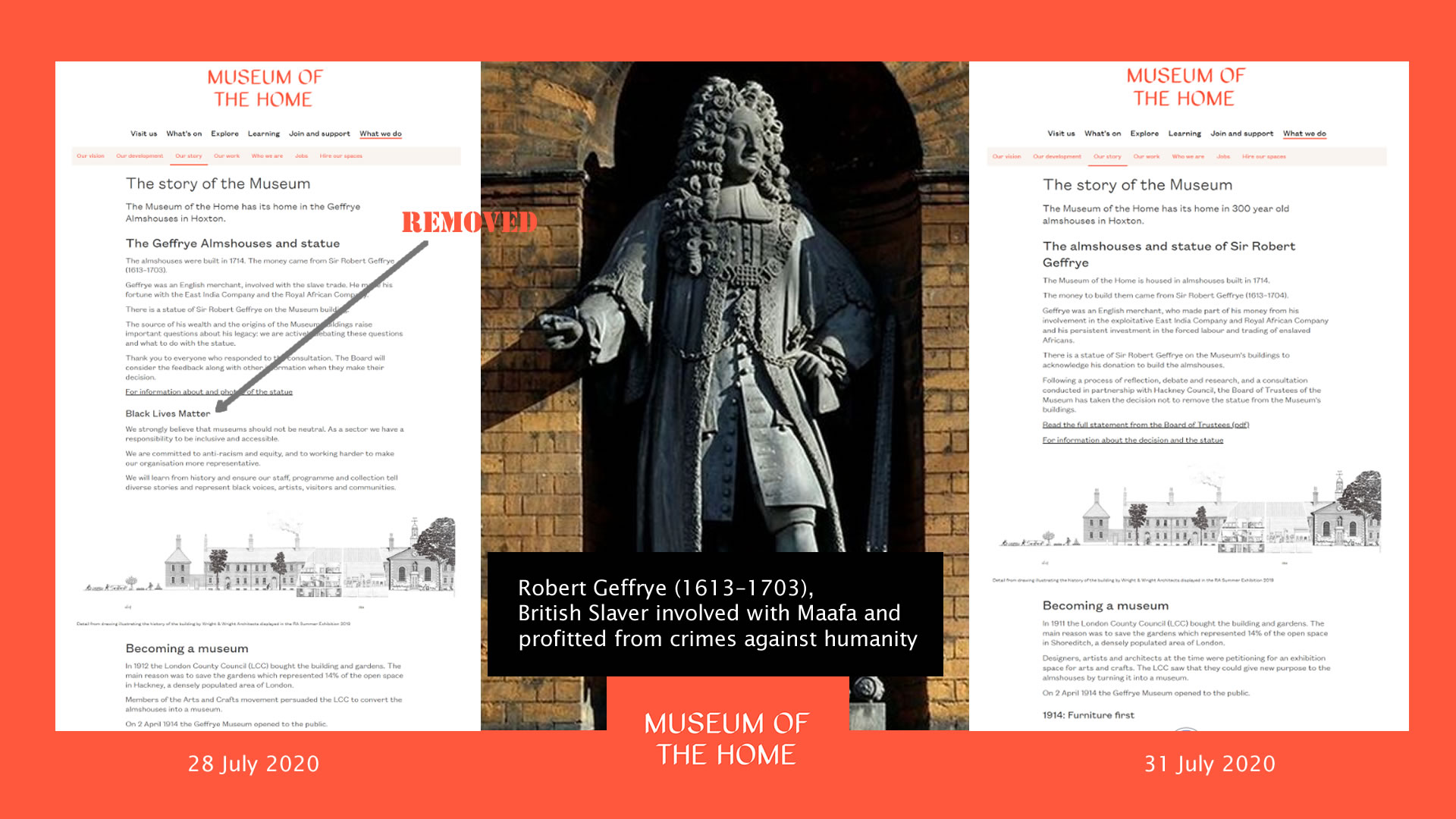
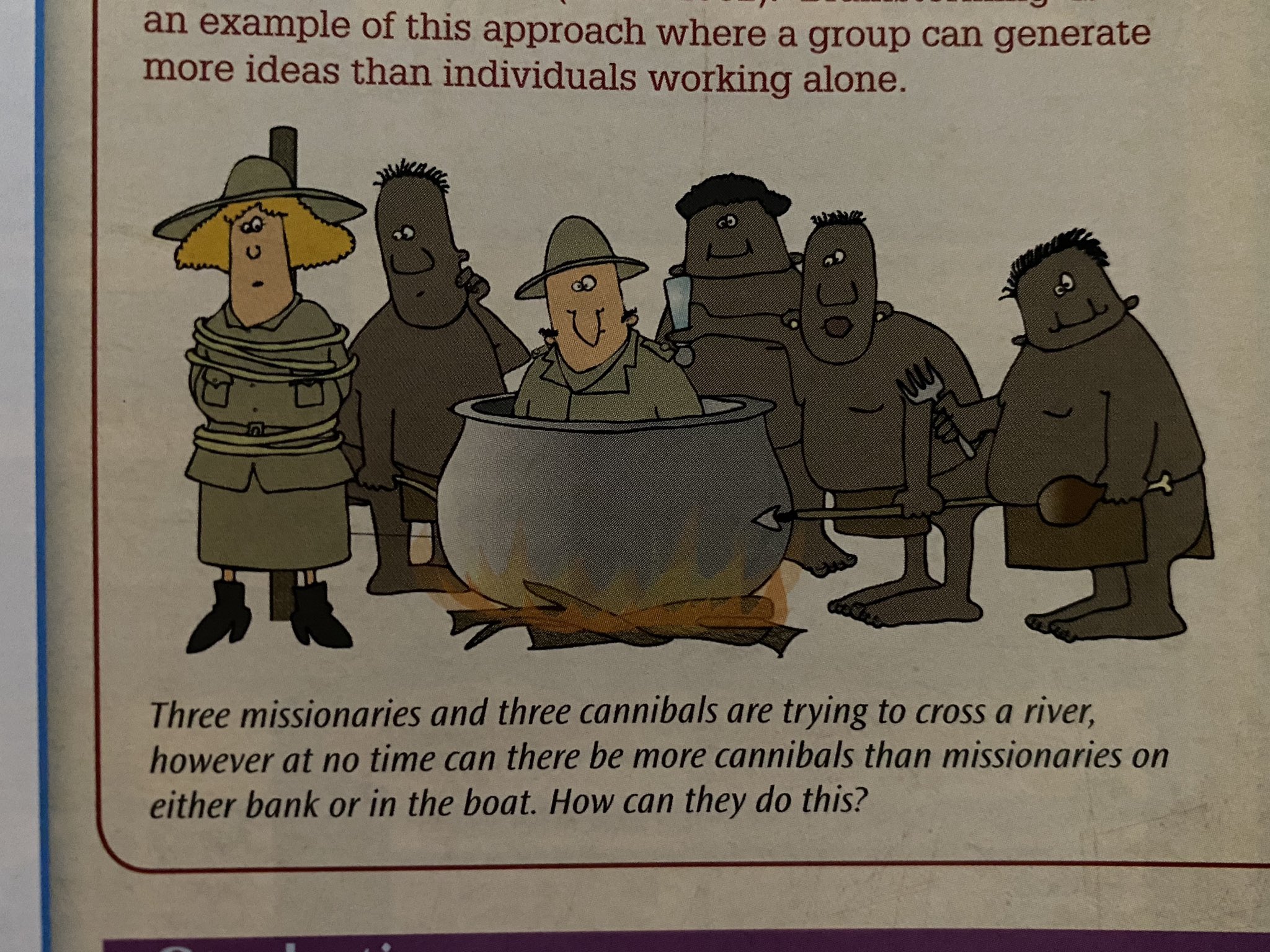
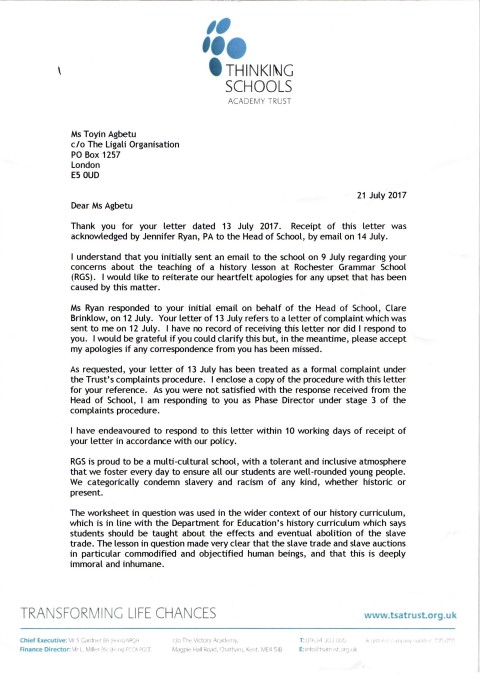

Get involved and help change our world